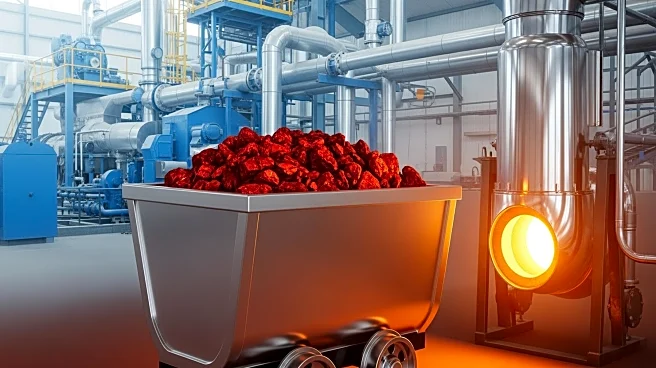What's Happening?
Guinea is set to expedite the development of alumina refineries and iron-ore pellet plants, marking a significant shift from decades of raw ore exports. The Mines Minister, Bouna Sylla, announced that
the country is preparing for the first shipments from the Simandou iron-ore mine. This move aims to transform Guinea's economy by creating industrial jobs and reducing exposure to commodity price fluctuations. Currently, Guinea exports about 60% of its bauxite to China, and a third of the iron ore from Simandou is destined for Chinese mills. The country has signed its first alumina refinery deal with China's SPIC, with construction underway and completion expected by 2027. Talks for additional plants are advanced with Chinalco and France's Alteo, and ongoing with Compagnie des Bauxites de Guinee and Alcoa.
Why It's Important?
The development of domestic processing facilities is crucial for Guinea to maximize returns from its mineral resources, boost economic growth, and reduce costly imports. By increasing its refining capacity, Guinea aims to install up to six alumina refineries by 2030, enhancing its processing capacity to seven million metric tons annually. This initiative aligns with broader trends among mineral-rich African countries seeking to enhance domestic refining capabilities. The shift from exporting raw materials to processed goods could significantly impact global aluminum and steel markets, given Guinea's strategic location and resource quality.
What's Next?
Guinea plans to push for domestic processing of iron-ore, with agreements requiring Rio Tinto and Winning Consortium Simandou to study and potentially build a steel plant or pellet facility. Feasibility studies for these projects are expected within two years of first exports. If the partners fail to deliver, Guinea may engage a global firm to conduct the study. The country is also exploring energy solutions, including hydro, solar, and liquefied natural gas investments, to support these industrial developments.
Beyond the Headlines
Guinea's strategic location offers a logistics advantage over Middle Eastern hubs, potentially positioning it as a key player in the global green steel market. The focus on producing pellets and direct reduced iron aligns with global trends towards sustainable steel production. However, energy remains a significant challenge, with Guinea actively seeking investments to overcome this hurdle.









